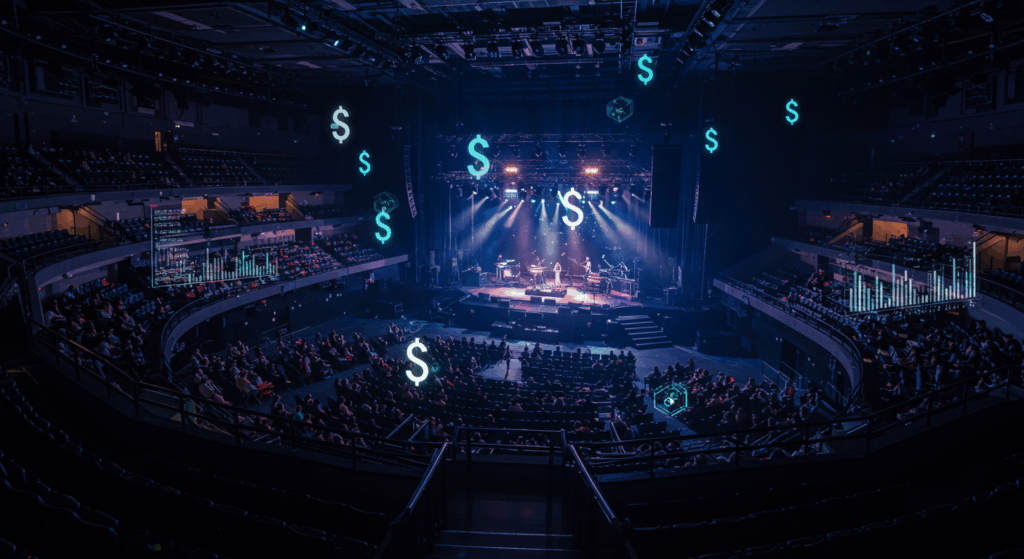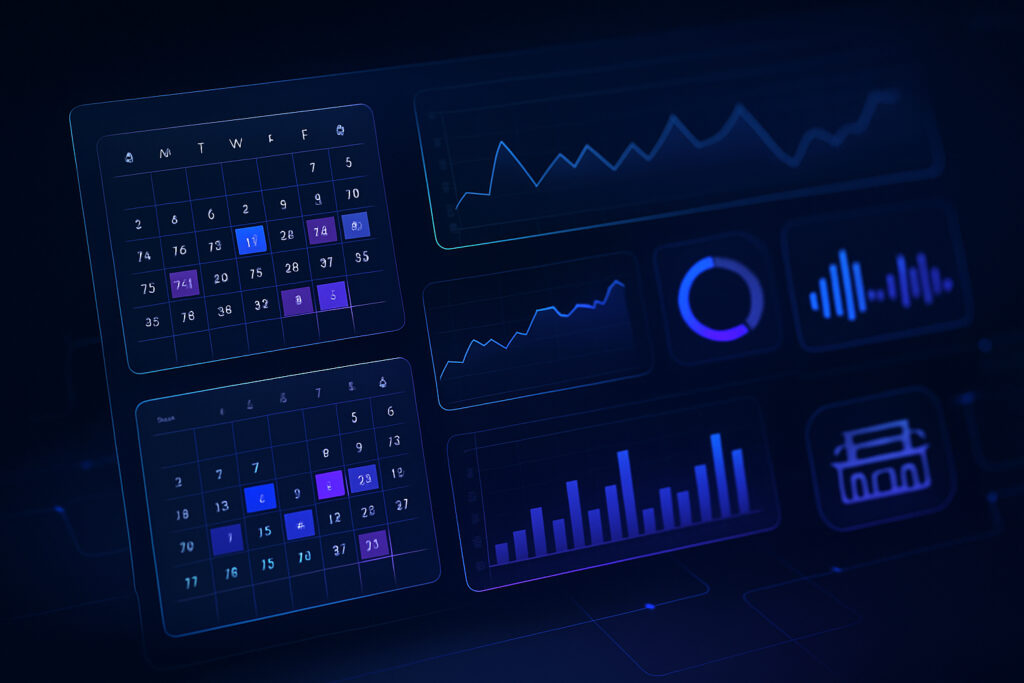
Tips on Building a Concert Budget Template
Smart concert budgeting is the difference between profitable shows and financial disasters.
- Live music revenue hit $33 billion in 2023 with 25% growth, but artists only profit $8 from a $100 ticket
- Manual spreadsheet tracking leads to cost overruns, missed settlements, and lost revenue opportunities
- Comprehensive budget templates with automated expense tracking reduce errors and cut settlement time in half
- Modern concert budgeting software integrates ticketing, expense tracking, and settlement processes into one streamlined platform
Ditch manual budgeting and embrace automated concert budget templates that deliver results.
The secret to sustainable success in live music isn’t just booking great acts; it’s mastering the money game. With live music industry revenues reaching record highs and the market projected to hit $79.7 billion by 2030, every dollar counts. A solid concert budget is your financial lifeline.
From the moment an event is confirmed, a well-designed concert budget template becomes your command center. You can calculate revenue projections, track real expenses, and build settlement documents long before the house lights dim. With a specialized approach to live music management, you eliminate the worry of misplaced receipts and turn settling into a streamlined process that actually works.
Why Does Your Concert Budget Template Make or Break Your Show?
The music industry has a reputation for flying by the seat of its pants. Spreadsheets scattered across multiple devices, handwritten notes on bar napkins, and the inevitable scramble for receipts after the show ends. This old-school approach might work for garage bands, but it’s financial suicide for serious music professionals.
A proper concert budget template serves as your financial roadmap, offering consistency across all your events and providing total visibility into profit and loss scenarios. When Live Nation reported record revenues of $23.16 billion in 2024, you can bet they weren’t using sticky notes to track their expenses.
Modern concert budgeting template software delivers comprehensive alignment for all stakeholders involved in your events. Features include improved ticket management, real-time financial analytics, and a direct path to seamless settlements. The key difference between amateur hour and professional operations often comes down to how well you handle the money side of the business.
How Different Stakeholders Use Concert Budgeting Templates
The beauty of a well-designed concert budget template lies in its versatility. Different players in the live music ecosystem use the same foundational tool in uniquely powerful ways.

Live Music Venues rely on budget templates to simultaneously manage multiple revenue streams. They’re tracking everything from bar sales and merchandise to rental fees and sponsorship deals. Venue operators need to see how each show impacts their bottom line while managing fixed costs like utilities, staff, and maintenance. The template becomes their crystal ball for predicting which types of shows generate the most profit and which might drain resources.
Concert Promoters use budget templates as their risk management tool. They’re calculating artist guarantees against projected ticket sales, factoring in marketing spend, and building contingency funds for weather delays or equipment failures. For promoters, the template is how they make smart bets on which shows will succeed.
Booking Agencies leverage budget templates to provide value-added services to their roster of artists. They help acts understand the true cost of touring, negotiate better deals with venues, and ensure everyone gets paid correctly and on time. When agencies can demonstrate clear financial tracking and transparent settlements, they build trust with both artists and venues.
To maximize operational efficiency, understanding how to streamline venue and promoter workflows becomes critical to long-term success. The right systems make complex multi-stakeholder events feel effortless.
What Artist Deal Terms Should You Account For?
Before you start plugging numbers into your concert budgeting template, you need to understand how different artist deals impact your financial structure. Three primary deal types require different budgeting approaches.
Flat Guarantee deals are the simplest from a budgeting perspective. The artist receives a predetermined amount regardless of ticket sales, transferring financial risk to the promoter while providing payment certainty for the performer. Your template needs to account for this fixed cost upfront, with clear visibility into how many tickets you must sell to break even.
Guarantee Plus Percentage deals create a hybrid model in which the artist receives both a guaranteed minimum and a share of the net profits above that amount. Your concert budget template must track the break-even point where percentage sharing kicks in, calculating how additional sales impact both your profit margin and the artist’s earnings.
Versus Deals pay the artist either the guarantee or their percentage of net income, whichever is greater. This requires dynamic calculations in your budget template, with clear modeling of different scenarios based on potential attendance numbers. The template should highlight the crossover point where percentage payments exceed the guarantee.
How Do You Calculate Gross Potential and Revenue Projections?
Smart concert budgeting starts with understanding your maximum earning potential. Gross potential represents total possible revenue from a completely sold-out show, calculated by multiplying ticket prices by venue capacity across all price tiers.
Where most people get it wrong is stopping at ticket sales. Comprehensive revenue calculations include merchandise sales, concessions, parking fees, VIP experiences, and sponsorship revenue. According to industry analysis, ticketing fees alone account for about 20% of a ticket price, so multiple revenue streams can compound to create your total earning potential.
Your concert budget template should model multiple perspectives, including conservative, realistic, and optimistic scenarios. Conservative estimates help you avoid financial disasters, while optimistic projections reveal upside opportunities for additional investment in marketing or production value.
Manual vs Software Concert Budgeting: The Reality Check
| Factor | Manual Spreadsheets | Concert Budget Software |
| Setup Time | Hours of template creation per event | Minutes using pre-built templates |
| Error Rate | High risk of calculation mistakes | Automated calculations eliminate errors |
| Settlement Speed | Multi-day manual compilation | Same-day automated reports |
| Collaboration | Email chaos, version conflicts | Real-time updates, single source |
| Historical Analysis | Manually compare old files | Automated reporting and trends |
| Receipt Management | Physical files, lost documents | Digital attachment and storage |
| Real-time Updates | Manual entry delays | Automatic ticket sales integration |
While manual budgeting might seem cost-effective upfront, the hidden costs in time, errors, and missed opportunities make software solutions essential for serious music professionals.
What Should You Know About Breaking Down Concert Expenses?
Understanding your expense categories transforms budget planning from guesswork into strategic decision-making. Modern concert budgeting requires precise categorization to maximize both accuracy and tax benefits.
Fixed Expenses remain constant regardless of attendance numbers. Venue rental typically represents the largest single expense, with costs varying based on venue size, location, and included amenities. Insurance, basic security, and technical staff fall into this category, providing budget certainty but limiting flexibility.
Variable Expenses fluctuate based on show size and complexity. Artist fees, additional production, enhanced security, and marketing campaigns scale with ambition and attendance projections. Smart promoters build variable expense models that automatically adjust based on ticket sales milestones.
Revenue-Dependent Costs include credit card processing fees, sales commissions, and percentage-based venue charges. These expenses grow with success, making them easier to manage but important to factor into profit calculations.
Staging costs typically account for about 30% of ticket prices, while ticketing fees can reach 28% of face value nationwide. The remaining revenue gets divided between artists, promoters, and venues based on negotiated agreements.
What Essential Elements Must Every Budget Template Include?
A bulletproof concert budget goes beyond basic income and expenses. Here are the non-negotiable components that separate basic spreadsheets from industry-grade budgeting tools:
Live Sales Integration automatically updates revenue projections as tickets sell, eliminating manual data entry and providing instant visibility into performance against projections.
Receipt Management System allows digital attachment of invoices and receipts to specific expense categories, creating an organized paper trail that streamlines settlement and tax preparation.
Multi-Currency Support becomes essential when booking international acts or selling tickets to global audiences, with automatic exchange rate updates preventing costly currency miscalculations.
Settlement Automation generates professional post-show financial reports directly from budget data, ensuring accuracy and speeding up the payment process.
Historical Performance Tracking maintains records of past events for comparison and forecasting, helping identify trends and improve future budget accuracy.
Stakeholder Access Controls enable secure sharing with artists, agents, and venue partners while protecting sensitive financial information through customizable permission levels.
How Do You Build Settlement Documents Throughout the Process?
The most stressful part of concert promotion often happens after the music stops: settlement. Smart budgeting eliminates this stress by building settlement documents throughout the planning process rather than scrambling afterward.
Professional concert venue settlement practices involve continuous documentation rather than post-event compilation. As expenses get paid and revenues are recorded, your budget template should automatically populate settlement sheets with real-time accuracy.
Modern event management systems maintain detailed logs of all financial transactions, creating transparent records that protect both promoters and artists. When questions arise during settlement, comprehensive documentation eliminates disputes and builds trust for future collaboration.
The integration of venue ticketing systems with budget templates ensures that final ticket counts, sales figures, and fee calculations flow seamlessly into settlement documents without manual transfer errors.
What’s the Best Approach to Smart Expense Tracking and Documentation?
Professional-grade systems capture, categorize, and analyze spending patterns to improve future budget accuracy and identify cost-saving opportunities.
Digital receipt management creates organized, searchable records. Photos of receipts automatically attach to relevant expense categories, while OCR technology extracts key information for automated data entry.
For teams managing multiple events, effective music venue management requires systems that coordinate staff responsibilities, track payment schedules, and maintain clear accountability for all financial commitments.
Real-time expense tracking enables proactive budget management rather than reactive damage control. When categories approach their limits, automated alerts enable course corrections before overspending becomes a problem.
How Should You Handle Payment Schedules and Team Coordination?
Concert budgeting extends beyond money to include people management. Your template should track who gets paid when, ensuring smooth operations and maintaining professional relationships across all stakeholders.
Pre-event payments often include venue deposits, artist advances, and equipment rentals. Post-event settlements cover final artist payments, crew wages, and cleanup costs. Clear payment scheduling prevents cash flow problems and eliminates the awkward conversations that arise when people don’t get paid on time.
Comprehensive event management coordinates financial obligations with operational timelines, ensuring that critical payments align with project milestones and cash flow realities.
Modern venues recognize that upgrading their management systems eliminates the administrative burden that consumes hours of productive time each day, freeing staff to focus on delivering exceptional experiences.
Why Does Technology Beat Spreadsheets for Concert Budgeting?
Manual concert budgeting feels like trying to navigate with a paper map when GPS exists. While spreadsheets might seem familiar, they create more problems than they solve for music pros.

Automated concert budget platforms integrate directly with ticketing systems, pulling real-time sales data and eliminating manual entry errors. When venues harness data effectively, they make informed decisions that directly impact profitability and operational efficiency.
Modern platforms provide collaborative features that keep all stakeholders informed without compromising sensitive financial information. Artists can track their projected earnings, while venue partners stay updated on relevant operational details, all through controlled access to the same underlying data.
The shift from reactive to proactive financial management transforms how live music professionals approach their business. Instead of hoping for the best and dealing with problems after they occur, smart budgeting enables strategic planning and risk mitigation.
How Do You Maximize Your Concert Budget Template Investment?
Technology should amplify human expertise, not replace it. The most successful music professionals combine sophisticated budgeting tools with industry knowledge and creative problem-solving skills.
Your concert budget template becomes more valuable over time as historical data accumulates. Patterns emerge that reveal which venue types, artist genres, and promotional strategies generate the best returns on investment. This intelligence transforms gut-feeling decisions into data-driven strategies.
Professional platforms eliminate the technical barriers that prevent focus on what matters most: creating amazing live music experiences. When settlement processes run smoothly and financial tracking happens automatically, creative energy flows toward programming, marketing, and audience development.
Frequently Asked Questions
How much should I budget for contingencies in my concert budget template? Contingency planning is essential for concert budgeting, though the exact amount varies by event complexity and venue type. Industry veterans recommend building buffers for unexpected expenses like weather-related delays, equipment failures, or last-minute production changes. The exact percentage depends on your experience level and the specific risks associated with your event type.
Can I use the same concert budgeting template for different venue sizes? While the basic structure remains consistent, venue-specific factors require template customization. Small club shows focus heavily on door splits and bar revenue, while arena events involve complex production costs and multiple revenue streams. The best approach uses scalable templates that adapt to different scenarios.
What’s the biggest mistake people make with concert budget templates? Underestimating the true cost of event expense tracking and settlement preparation. Many people budget for obvious expenses like artist fees and venue rental, but forget about credit card processing fees, insurance requirements, and the time value of manual administrative work.
How do I handle international artist deals in my concert budget template? International bookings require additional budget categories for visa processing, currency exchange fluctuations, and enhanced travel costs. Build in buffers for exchange rate changes and work with experienced booking agents who understand cross-border regulations. Many venues use specialized software that handles multi-currency transactions automatically.
Ready to Transform Your Concert Budgeting Process?
The live music industry rewards those who master both the creative and business sides of the equation. With recorded music revenues growing 4% to $8.7 billion in 2024, opportunities abound for professionals who approach concert budgeting with the sophistication it deserves.
Prism offers a specialized concert budgeting system designed specifically for live music professionals. From instant financial reporting to automated settlement generation, our platform eliminates spreadsheet headaches and provides the visibility needed to build sustainable, profitable businesses.
Stop letting budget chaos limit your potential. Get started with Prism today and discover how proper concert budget templates can transform your live music operations from stressful scrambles into streamlined successes.

Matt Ford is the founder and CEO of Prism.fm, an Austin-based software company revolutionizing live music event management. With a background in entrepreneurship and a degree from the University of Wisconsin-Madison School of Business, Ford combined his self-taught coding skills with firsthand experience as a concert promoter to address the inefficiencies he observed in the industry. In 2018, he launched Prism.fm, an all-in-one platform designed to streamline operations for venues, promoters, and agencies by replacing cumbersome spreadsheets with integrated tools for booking, financial tracking, and contract management. Under his leadership, Prism.fm has grown significantly, achieving $3 million in annual recurring revenue post-COVID and securing over $15 million in funding . Ford’s commitment to building user-centric solutions has positioned Prism.fm as a trusted partner for over 1,500 venues and promoters worldwide.



